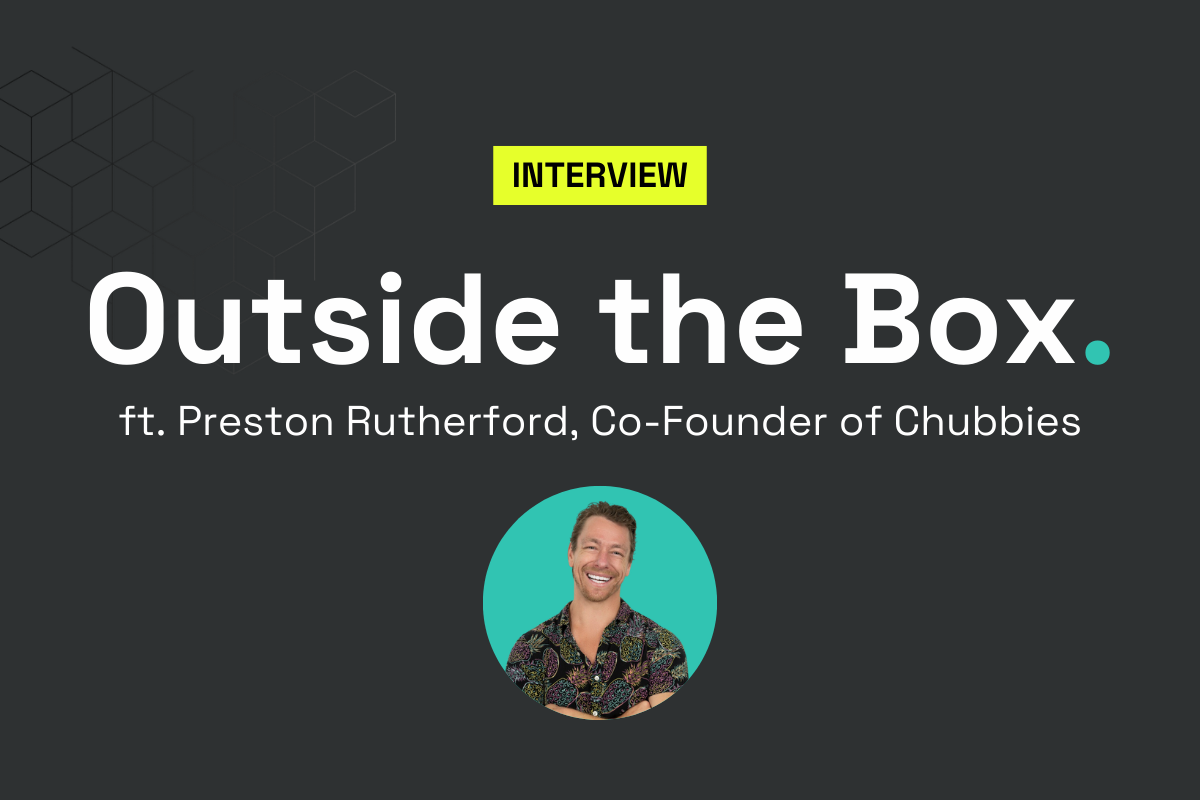From Shorts to Success: A Conversation with Preston Rutherford, Co-founder of Chubbies
In this episode of our new podcast interview series Outside the Box, we sit down with Preston Rutherford, co-founder of Chubbies Shorts, to discuss his journey from startup to a nine-figure exit and being part of a billion-dollar IPO. Preston: shares insights on brand building, customer relationships, and the evolving landscape of e-commerce.
The Birth of Chubbies
Anthony: Let's start at the beginning. How did you get into e-commerce, and did you always have a vision for building an e-commerce brand?
Preston:: Honestly, there was no grand vision. It was mostly that we hated working for other people. We graduated in '08, which wasn't a great time economically. There was a lot of stress and it was hard to get jobs.
We all had different journeys after college. One of us was in private equity, another at Dockers after doing the GAP training program, I was at a tech startup, and another was in venture capital. Kyle, one of the co-founders, had a chance to invest in Shopify really early through his private equity firm. Although that didn't work out, he grasped the possibilities associated with what Shopify was building.
It was mostly a response to wanting to start something, see if we could create something that didn't exist previously, and work with our friends. We felt there was a product gap in the market.
The Chubbies Brand Philosophy
Preston: At the time, Abercrombie represented everything we thought was wrong with men's fashion. Their vibe was exclusionary, taking oneself seriously, and implying "we're cooler than you." We wanted to do the opposite.
We called ourselves Chubbies, gave it a ridiculous name, and decided to make tiny shorts. The inspiration came from pictures of our dads on spring break in the '70s and '80s. We couldn't find shorter shorts anywhere except thrift stores, so we saw an opportunity.
Evolution of the Product Line and Brand
Anthony: I'm curious about the evolution of your product line. How did you navigate the transition from your initial offering to a broader range of products?
Preston: The complexity increased across every part of the business. Tom and I focused on marketing, Kyle on ops, inventory management, and fulfillment logistics. I touched on fulfillment logistics as well, dealing with 3PL and all the data around cutting costs with shipping prices and freight costs going up.
SKUs are hard, especially in clothing. It would be cool if we were a single SKU business with no seasonality, but that wasn't us. This complexity affected everything in the fulfillment center, understanding inventory, deciding what to put in stores or wholesale once we went multi-channel.
Customer Interactions and Brand Building
Anthony: Can you share a story about a customer interaction that fundamentally changed how you approach your business?
Preston: There are three that come to mind. First, seeing someone tag Chubbies on Facebook, doing something we were doing, without us knowing them directly. It was powerful to see unsolicited engagement, showing there was something special about our brand.
Second, on my wedding day, about an hour before walking down the aisle, I got a text from a customer with an order issue. I responded quickly, letting them know it was my wedding day. That story, in a tiny way, kind of went viral.
Third, recently a customer texted me seven years after getting one of our inbox inserts - leather coasters with Chubbies on them. His Great Dane had eaten them after they'd been on his coffee table for seven years. It blew my mind in terms of the longevity and durability of customer interactions.
Marketing Evolution and Brand Focus
Preston: A significant milestone was transitioning from classic direct response marketing to a more balanced approach of brand and performance marketing. We realized we had largely forgotten to focus on building a base of organic sales - people searching for "Chubbies swim trunks" rather than just "swim trunks."
This transition had material positive economic benefits on the business and really helped us through iOS 14 changes and customer acquisition challenges.
The Future of E-commerce
Anthony: When you look at the future of e-commerce, what excites you?
Preston: I'm excited to see better content fill my feeds. If people start to recognize the need for more brand-forward stuff, hopefully, a larger percentage of ads will actually be good, interesting, and funny, rather than just product shots with big CTAs.
I'm also excited about omnichannel expansion. Businesses are understanding the value of resilience through multiple cash flow streams and the power of showing up in person to fuel the e-commerce business.
Broadly, I think there's a return to basics. The macro environment is tougher, and brands are experiencing more friction and headwinds in trying to grow, particularly in terms of profit. The old classic playbook that had been working for the last N years is no longer as effective, so we're seeing a return to brand building and making people feel something.
Advice for Aspiring Entrepreneurs
Anthony: If you were mentoring young entrepreneurs just starting out in e-commerce today, what's the most important lesson you'd want to impart?
Preston: Time horizon is crucial. If you're making something that someone else can easily copy, your time horizon is going to be completely different from a SaaS business or one with massive technology IP.
To the extent you can optimize over a five or ten-year period, that's important. There are countless examples of people who took long time horizons - they were never the sexy thing written up in TechCrunch or Forbes. They were just doing their thing, and then 20, 25, 30 years later, they're doing a billion in top line and dropping 300 to the bottom line.
Understanding what success means is key. If it's just revenue, it's hard to have that long time horizon. But if it's about growing demand or increasing desirability, like Bernard Arnault of LVMH says, or increasing prices faster than inflation without losing customers, as Warren Buffett suggests, that's a different approach.
Closing Thoughts
Preston: I want to emphasize that none of this is about me. This is about the team - the other co-founders and the broader Chubbies team. They deserve all the props for all the success. It's truly a team effort, with so much luck involved too.
It's like what we see with Olympic athletes - for those 9.6 seconds of action, there are years of constant effort, failing, getting back up, and trying again. That's what it takes to build a successful business too.




















